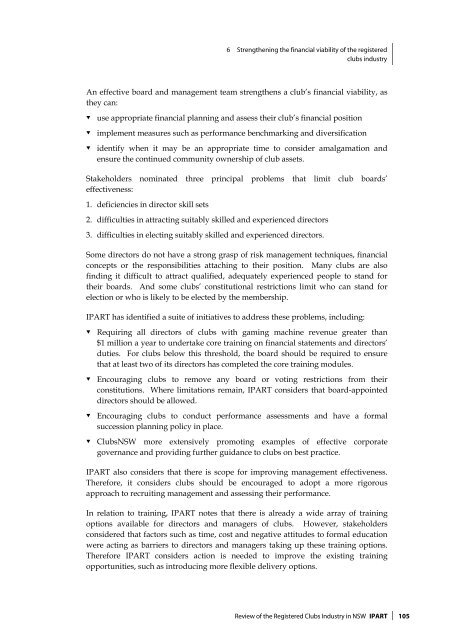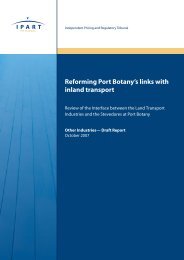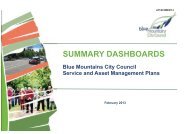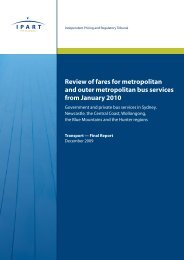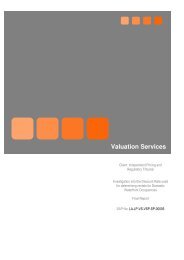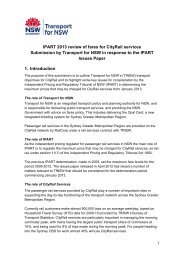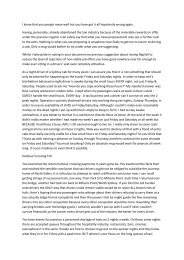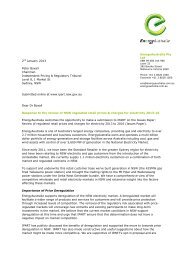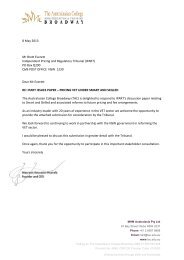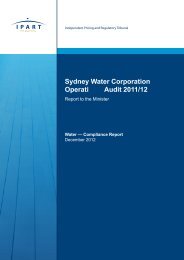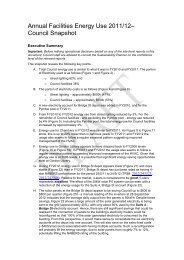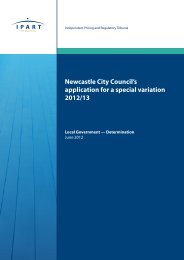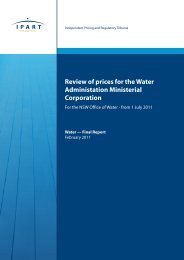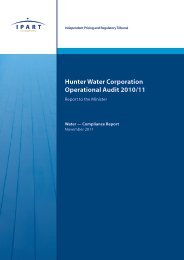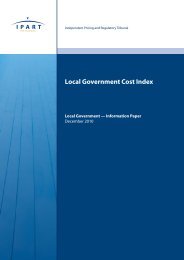Review of the Registered Clubs Industry in NSW - Clubs NSW
Review of the Registered Clubs Industry in NSW - Clubs NSW
Review of the Registered Clubs Industry in NSW - Clubs NSW
You also want an ePaper? Increase the reach of your titles
YUMPU automatically turns print PDFs into web optimized ePapers that Google loves.
6 Streng<strong>the</strong>n<strong>in</strong>g <strong>the</strong> f<strong>in</strong>ancial viability <strong>of</strong> <strong>the</strong> registered<br />
clubs <strong>in</strong>dustry<br />
An effective board and management team streng<strong>the</strong>ns a club’s f<strong>in</strong>ancial viability, as<br />
<strong>the</strong>y can:<br />
<br />
<br />
<br />
use appropriate f<strong>in</strong>ancial plann<strong>in</strong>g and assess <strong>the</strong>ir club’s f<strong>in</strong>ancial position<br />
implement measures such as performance benchmark<strong>in</strong>g and diversification<br />
identify when it may be an appropriate time to consider amalgamation and<br />
ensure <strong>the</strong> cont<strong>in</strong>ued community ownership <strong>of</strong> club assets.<br />
Stakeholders nom<strong>in</strong>ated three pr<strong>in</strong>cipal problems that limit club boards’<br />
effectiveness:<br />
1. deficiencies <strong>in</strong> director skill sets<br />
2. difficulties <strong>in</strong> attract<strong>in</strong>g suitably skilled and experienced directors<br />
3. difficulties <strong>in</strong> elect<strong>in</strong>g suitably skilled and experienced directors.<br />
Some directors do not have a strong grasp <strong>of</strong> risk management techniques, f<strong>in</strong>ancial<br />
concepts or <strong>the</strong> responsibilities attach<strong>in</strong>g to <strong>the</strong>ir position. Many clubs are also<br />
f<strong>in</strong>d<strong>in</strong>g it difficult to attract qualified, adequately experienced people to stand for<br />
<strong>the</strong>ir boards. And some clubs’ constitutional restrictions limit who can stand for<br />
election or who is likely to be elected by <strong>the</strong> membership.<br />
IPART has identified a suite <strong>of</strong> <strong>in</strong>itiatives to address <strong>the</strong>se problems, <strong>in</strong>clud<strong>in</strong>g:<br />
<br />
<br />
<br />
<br />
Requir<strong>in</strong>g all directors <strong>of</strong> clubs with gam<strong>in</strong>g mach<strong>in</strong>e revenue greater than<br />
$1 million a year to undertake core tra<strong>in</strong><strong>in</strong>g on f<strong>in</strong>ancial statements and directors’<br />
duties. For clubs below this threshold, <strong>the</strong> board should be required to ensure<br />
that at least two <strong>of</strong> its directors has completed <strong>the</strong> core tra<strong>in</strong><strong>in</strong>g modules.<br />
Encourag<strong>in</strong>g clubs to remove any board or vot<strong>in</strong>g restrictions from <strong>the</strong>ir<br />
constitutions. Where limitations rema<strong>in</strong>, IPART considers that board-appo<strong>in</strong>ted<br />
directors should be allowed.<br />
Encourag<strong>in</strong>g clubs to conduct performance assessments and have a formal<br />
succession plann<strong>in</strong>g policy <strong>in</strong> place.<br />
<strong>Clubs</strong><strong>NSW</strong> more extensively promot<strong>in</strong>g examples <strong>of</strong> effective corporate<br />
governance and provid<strong>in</strong>g fur<strong>the</strong>r guidance to clubs on best practice.<br />
IPART also considers that <strong>the</strong>re is scope for improv<strong>in</strong>g management effectiveness.<br />
Therefore, it considers clubs should be encouraged to adopt a more rigorous<br />
approach to recruit<strong>in</strong>g management and assess<strong>in</strong>g <strong>the</strong>ir performance.<br />
In relation to tra<strong>in</strong><strong>in</strong>g, IPART notes that <strong>the</strong>re is already a wide array <strong>of</strong> tra<strong>in</strong><strong>in</strong>g<br />
options available for directors and managers <strong>of</strong> clubs. However, stakeholders<br />
considered that factors such as time, cost and negative attitudes to formal education<br />
were act<strong>in</strong>g as barriers to directors and managers tak<strong>in</strong>g up <strong>the</strong>se tra<strong>in</strong><strong>in</strong>g options.<br />
Therefore IPART considers action is needed to improve <strong>the</strong> exist<strong>in</strong>g tra<strong>in</strong><strong>in</strong>g<br />
opportunities, such as <strong>in</strong>troduc<strong>in</strong>g more flexible delivery options.<br />
<strong>Review</strong> <strong>of</strong> <strong>the</strong> <strong>Registered</strong> <strong>Clubs</strong> <strong>Industry</strong> <strong>in</strong> <strong>NSW</strong> IPART 105


